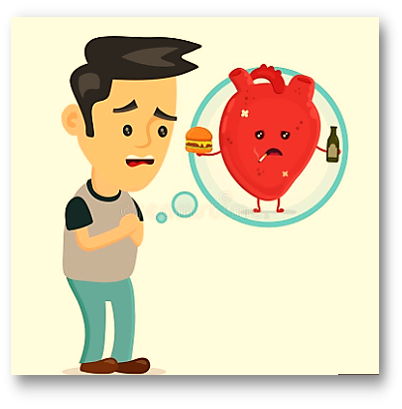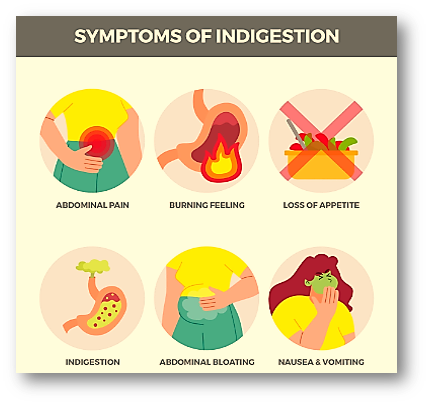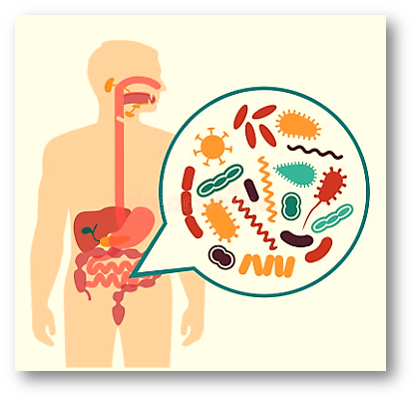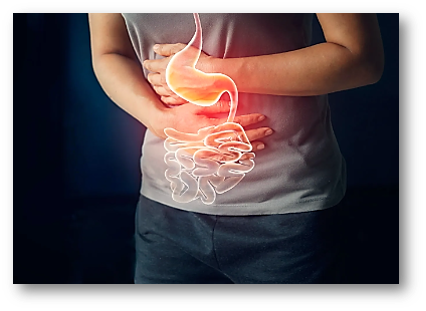Indigestion issue, also known as dyspepsia, is a common condition that causes discomfort or pain in the upper abdomen. It is often accompanied by symptoms such as bloating, heartburn, nausea, and belching. Some common causes of indigestion include overeating, eating too quickly, eating high-fat foods, consuming alcohol or caffeinated beverages, stress, and certain medications.

To alleviate indigestion, you can try the following steps:
Avoid trigger foods:
Keep a food diary to identify any foods that seem to trigger your symptoms and avoid them as much as possible.
Eat smaller, more frequent meals:
Eating smaller, more frequent meals instead of three large meals can reduce the amount of pressure on your stomach and help to prevent indigestion.
Avoid lying down after eating:
Wait at least 3 hours after eating before lying down or going to bed.
Practice relaxation techniques:
Stress can trigger indigestion, so practicing relaxation techniques such as deep breathing, yoga, or meditation can help to reduce symptoms.
Over-the-counter antacids:
Antacids such as Tums, Rolaids, or Maalox can neutralize stomach acid and provide relief from indigestion symptoms.
If your symptoms persist or become severe, it’s important to consult with a healthcare provider, as indigestion can be a symptom of a more serious underlying condition.
WHAT ARE THE CAUSES OF INDIGESTION?
Indigestion can be caused by a variety of factors, including:
Overeating or eating too quickly:
Eating too much or too quickly can put pressure on the muscle that separates the esophagus and stomach, leading to indigestion.
Fatty, spicy, or acidic foods:
Foods that are high in fat, spicy, or acidic can irritate the stomach and cause indigestion.
Alcohol and caffeine:
Consuming excessive amounts of alcohol and caffeinated beverages can cause indigestion by irritating the stomach and increasing the production of stomach acid.
Smoking:
Smoking can irritate the digestive system and cause indigestion.
Stress:
Stress and anxiety can cause a physical reaction in the body that can lead to indigestion.
Certain medications:
Some medications, such as nonsteroidal anti-inflammatory drugs (NSAIDs) and aspirin, can cause indigestion by irritating the stomach lining.
Hormonal changes:
Hormonal changes in women, such as during pregnancy or menopause, can cause indigestion.
Peptic ulcers:
Peptic ulcers, which are sores that develop on the lining of the stomach or small intestine, can cause indigestion.
Gastroesophageal reflux disease (GERD):
GERD is a condition in which stomach acid flows back into the esophagus, causing heartburn and other symptoms of indigestion.
It’s important to note that indigestion can also be a symptom of a more serious underlying condition, such as a gastrointestinal infection, inflammatory bowel disease, or pancreatitis. If your symptoms persist or become severe, it’s important to consult with a healthcare provider.

HOW LONG INDIGESTION LASTS?
The duration of indigestion can vary from person to person and can depend on several factors, including the cause and severity of symptoms. In some cases, indigestion may only last for a few minutes or a few hours, while in other cases, it may persist for several days or even weeks.
Mild indigestion can often be relieved by making simple changes to your diet and lifestyle, such as avoiding trigger foods and eating smaller, more frequent meals. However, if your indigestion is caused by a more serious underlying condition, it may take longer to resolve and may require medical treatment.
If your indigestion symptoms persist for more than a few days or if you experience severe or worsening symptoms, it’s important to consult with a healthcare provider, as this could be a sign of a more serious underlying condition. They can perform a physical examination and, if necessary, perform tests to help determine the cause of your symptoms and develop an appropriate treatment plan.
IS INDIGESTION CAUSED BY ANY INFECTION??
Yes, indigestion can be caused by an infection. Gastrointestinal infections caused by bacteria, viruses, or parasites can cause symptoms such as abdominal pain, nausea, vomiting, and diarrhea, which can all contribute to indigestion.

Examples of infections that can cause indigestion include:
Food poisoning:
Food poisoning can be caused by eating food that is contaminated with bacteria, viruses, or toxins.
Gastroenteritis: Indigestion issue
Gastroenteritis is an inflammation of the stomach and intestines that can be caused by a viral or bacterial infection.
Helicobacter pylori (H. pylori) infection:
H. pylori is a type of bacterium that can infect the stomach and cause indigestion, as well as other symptoms such as heartburn, nausea, and bloating.
If you suspect that your indigestion may be caused by an infection, it’s important to see a healthcare provider for a proper diagnosis and appropriate treatment. They may perform tests such as stool sample analysis or blood tests to confirm the presence of an infection and determine the best course of treatment.
DRINKING WATER HELPS INDIGESTION!!
Drinking water can help relieve indigestion in some cases. When you’re experiencing indigestion, it can be helpful to drink water to help neutralize stomach acid and relieve symptoms such as heartburn and bloating. Drinking water can also help to flush out any irritants that may be causing your indigestion.
However, drinking large amounts of water at once can also put pressure on your stomach and exacerbate indigestion symptoms, so it’s best to drink small sips of water throughout the day. You may also want to avoid drinking water during meals, as this can dilute digestive juices and make indigestion symptoms worse.
It’s important to remember that indigestion can have many causes, and drinking water may not be effective in all cases. If your symptoms persist or become severe, it’s important to see a healthcare provider to determine the underlying cause of your indigestion and develop an appropriate treatment plan.
TO RELIEVE INDIGESTION PROBLEMS!!
There are several ways to relieve indigestion, including:
Changing your diet:
Avoiding trigger foods such as fatty, spicy, or acidic foods can help to relieve indigestion. Eating smaller, more frequent meals and avoiding overeating can also help.
Relaxation techniques:
Practicing relaxation techniques such as deep breathing, meditation, or yoga can help to reduce stress and relieve indigestion caused by anxiety or stress.
Chewing gum: Indigestion issue
Chewing gum can help to stimulate the production of saliva, which can neutralize stomach acid and relieve symptoms of heartburn.
Baking soda:
Mixing a half teaspoon of baking soda in a glass of water can help to neutralize stomach acid and relieve symptoms of indigestion.
Over-the-counter antacids:
Antacids, such as Tums or Rolaids, can help to neutralize stomach acid and relieve symptoms of heartburn.
Avoiding certain activities:
Avoiding activities that can worsen indigestion, such as lying down right after eating or wearing tight-fitting clothing, can help to relieve symptoms.
Elevating your head:
Elevating the head of your bed by six to eight inches can help to prevent stomach acid from flowing back into the esophagus and relieve symptoms of heartburn.
It’s important to remember that everyone’s experience with indigestion is unique, and what works for one person may not work for another. If your symptoms persist or become severe, it’s important to see a healthcare provider to determine the underlying cause of your indigestion and develop an appropriate treatment plan.
HOME REMEDIES FOR INDIGESTION!!
There are several home remedies that can help to relieve indigestion, including:
Ginger: Indigestion issue
Ginger has natural anti-inflammatory properties that can help to relieve indigestion, nausea, and bloating. You can drink ginger tea, chew on a piece of fresh ginger, or take ginger supplements.
Peppermint:
Peppermint has antispasmodic and anti-inflammatory properties that can help to relax the muscles in the digestive tract and relieve indigestion symptoms such as bloating and abdominal pain. You can drink peppermint tea, chew on peppermint gum, or take peppermint oil capsules.
Fennel:
Fennel has antispasmodic and carminative properties that can help to relieve indigestion and bloating. You can drink fennel tea, chew on fennel seeds, or add fennel to your meals.
Apple cider vinegar:
Apple cider vinegar has acetic acid, which can help to neutralize stomach acid and relieve symptoms of indigestion. You can mix one to two teaspoons of apple cider vinegar in a glass of water and drink it before a meal.
Chamomile:
Chamomile has natural calming properties that can help to relieve indigestion caused by stress or anxiety. You can drink chamomile tea or take chamomile supplements.
Licorice:
Licorice has anti-inflammatory properties that can help to soothe the lining of the digestive tract and relieve symptoms of indigestion. You can drink licorice tea or take licorice supplements.
It’s important to keep in mind that while these remedies can be helpful in relieving indigestion symptoms, they may not work for everyone and may not be suitable for all individuals. If your symptoms persist or become severe, it’s important to see a healthcare provider to determine the underlying cause of your indigestion and develop an appropriate treatment plan.
MISCONCEPTIONS ABOUT INDIGESTION!!
There are several misconceptions about indigestion that can lead to misunderstandings and improper treatment:
Indigestion is the same as heartburn:
While indigestion and heartburn can both cause discomfort in the chest and upper abdomen, they are different conditions. Heartburn is a specific symptom of acid reflux, while indigestion refers to a collection of symptoms, including heartburn.
Eating too much causes indigestion:
While overeating can contribute to indigestion, there are many other factors that can cause the condition, including certain foods and drinks, stress, medications, and medical conditions.
Antacids are the only treatment for indigestion:
Antacids can provide temporary relief for indigestion symptoms, but they do not treat the underlying cause of the condition. Depending on the cause, other treatments, such as lifestyle changes, dietary modifications, or medications, may be necessary to effectively manage indigestion.
Indigestion is not a serious condition:
While indigestion is often not a serious condition, in some cases, it can be a symptom of a more serious underlying medical condition, such as gastroesophageal reflux disease (GERD), peptic ulcers, or stomach cancer.
You can’t prevent indigestion:
While there is no guaranteed way to prevent indigestion, making lifestyle changes, such as avoiding trigger foods and drinks, reducing stress, and avoiding late-night meals, can help to reduce your risk of developing the condition.
It’s important to see a healthcare provider if you are experiencing persistent or severe symptoms of indigestion, as this can be a sign of an underlying medical condition that requires treatment. They can help to determine the cause of your indigestion and develop an appropriate treatment plan.
KEYWORDS:
Indigestion symptoms, Causes of indigestion, Indigestion relief, Home remedies for indigestion, Indigestion vs heartburn, chronic indigestion, Indigestion treatment, Prevention of indigestion, Foods that cause indigestion, Natural remedies for indigestion, Symptoms of indigestion in women, Indigestion during pregnancy, Severe indigestion symptoms, Indigestion, and bloating, Indigestion, and acid reflux, Indigestion issue, Indigestion issue, Indigestion issue,
REFERENCES:
https://www.nhs.uk/conditions/indigestion/
https://www.mayoclinic.org/diseases-conditions/indigestion/symptoms-causes/syc-20352211

